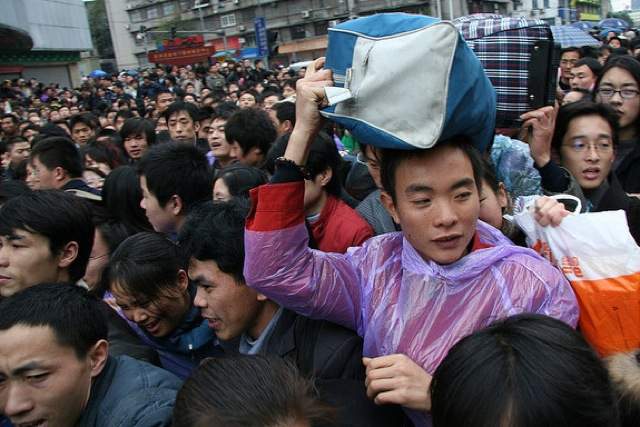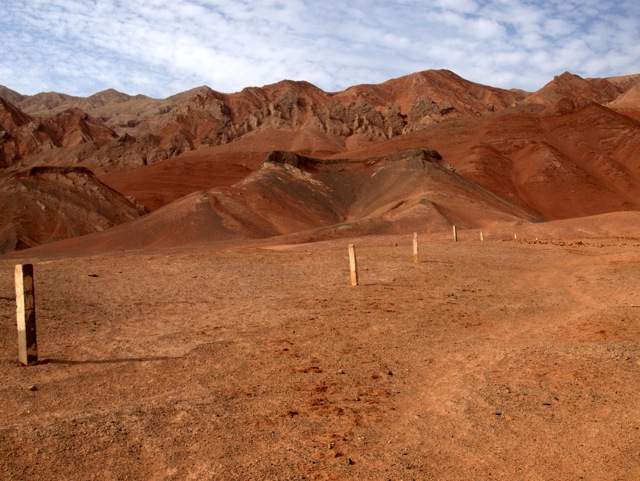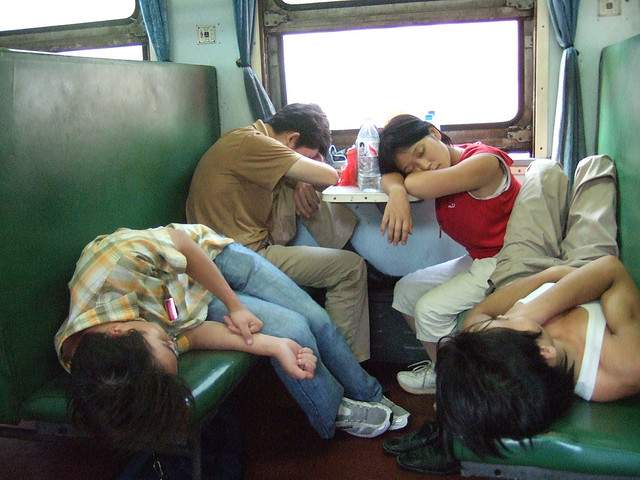“A Day in the Life” is a new series in which we chronicle a specific day in the life of a long-term traveler. The author chose this particular day to document for it’s representational capacity of so many days common to long-term travelers: days whiled away on public transportation, particularly trains, particularly trains that are particularly uncomfortable, where cultural isolation, discomfort, and boredom are intimate companions.
The moment I enter the Turpan train station, I know the next 30 hours are going to be rough.
The whole station is absurdly crowded, full of umbrellas and wet people and families huddled together and men smoking and stray dogs. The aisles are all muddy and clogged with luggage and the seats are all full and the signs are all in Mandarin.
I move through the crowd, making my way towards the lady behind what I assume is the information window, a lady who seems to grow increasingly nervous as I near her. When I finally reach the front I ask her how to find the train to Kashgar.
She shakes her head, not understanding.
‘Train, Kashgar,” I say again as the line behind me begins to shift and murmur impatiently.
But still she shrugs.

“Train to Kashgar, train to Kashgar,” I keep repeating as I push my way back towards the middle of the room until someone understands me and points towards the far side of the building. There, two glass doors leading out towards the tracks are just now opening to release a flood of hurried steps and luggage towards the newly-arrived trains. I push and strain until I’m released through the doors, but the moment I taste fresh air I find everyone else already hurrying frantically towards the train.
I feel ridiculous, my giant pack bouncing up and down on my back as I walk-run, but still I hurry, following the crowd across the lot into a tunnel.
Assuming I too should be hurrying, I begin walk-running alongside them. I feel ridiculous, my giant pack bouncing up and down on my back as I walk-run, but still I hurry, following the crowd across the lot into a tunnel where a short stone-faced policeman is waiting for us with an outstretched palm and a whistle. Blowing his whistle forcefully and repeatedly, he forces us to form a line three people wide down the left side of the tunnel and waits, blowing his whistle over and over again until everyone is lined up and sufficiently submissive, then he toots his whistle three times more and points, and all at once everyone begins hurrying again – old men with canes, women with strollers, children leaving dolls behind – everyone hurrying towards their respective boxcars.
I hurry alongside them. I want to stop to buy food and drinks from the snack cars along the way but am unwilling to spare a single second for fear of what may happen if I am late for whatever it was we’re all hurrying for.
When I finally reach the right boxcar my heart sinks. It’s a double-decker car with low ceilings and bolted windows, and it’s already completely packed with people, with the luggage racks above the seats overflowing with bags and jackets and suitcases and sacks of oddly-shaped things.
I stuff my backpack in a rack near the toilets, step cautiously over the people already sitting on the floor, and take my seat in the middle of five elderly Chinese women in blue and taupe pantsuits.
I’ve experienced my fair share of train journeys, some far longer than this one, but never in such a hard, straight-backed uncomfortable chair.
I’ve experienced my fair share of train journeys, some far longer than this one, but never in such a hard, straight-backed uncomfortable chair. I’m in the “hard-seat” class – the only ticket that was still available yesterday. These “hard seats” are set in rows three-wide facing one another across a space of less than a meter, which, given my height, means the lady in front of me is pretty much immured between my legs.
Less than ten minutes outside of Turpan, the Taklamakan desert rises up all around us. It is beautiful – a sea of sand – and I do my best to enjoy the view, or at least what I can see of it from around the heads of the women.

I spend an hour or so just looking out the window before I take out a book to read.
I can only get through a few pages before two children’s heads sprout over my shoulder and begin watching me, which makes it impossible for me to concentrate.
I put the book away and stare out the window for awhile more.
Then I begin staring at people.
I look closely at their faces and wonder about them. I wonder where they were born and where they are going, and about their lives, and about how they may compare to my own sad life. When they catch me looking, I quickly look at someone else, and so on, until I’ve made my way around the entire boxcar.
An hour or so later, the old women in pantsuits begin playing some extremely competitive card game.
I look closely at their faces and wonder about them. I wonder where they were born and where they are going, and about their lives.
It starts off calmly enough, but within a half hour it’s escalated into shouting and throwing cards and bumping me back and forth as they rake in money and fill the boxcar with laughter. And all around, seated on buckets and suitcases, hollering and pointing, spectators have gathered to watch.
It seems like a lot of fun for everyone except me, there in the middle of it all, lonely and ignored, only occasionally afforded a suspicious or perfunctory glance.

I distract myself by watching how briskly and effortlessly the other passengers make their way down the aisles, often with two feet between them and the ceiling.
Some of them could probably even jump without hitting their heads…
By contrast, everywhere I go is a journey fraught with self-consciousness. As I make my way down the aisle, lurching, crouching, my head cocked to the side to avoid the ceiling, an Oh My God Here He Comes look comes into peoples’ eyes. Husbands and wives stare. Children point. Old people’s mouths drop open. With my long brown hair, my huge eyes, my pale skin and my scraggly beard, I must seem pretty out of place to them.
Everywhere I go is a journey fraught with self-consciousness. As I make my way down the aisle, lurching, crouching, my head cocked to the side to avoid the ceiling, an Oh My God Here He Comes look comes into peoples’ eyes.
After lunch the two women across from me take off their shoes, stretch their legs out, and wedge their feet under my thighs.
Not fully able to believe someone would actually do that, I try express my annoyance with sighs and exasperated looks, but it doesn’t work. The women couldn’t care less, and soon they’ve fallen fast asleep.
A lady in a purple suit keeps passing by with a basket of snacks: dried yak meat, dumplings, pickled eggs, vacuum-sealed packages of tofu, baby octopus, and other unappetizing preserved chunks of oily meat.
I snack on a box of corn flakes as the aisles fill up with spat-out sunflower seed husks.
I sit there.
I sit there and I sit there until I’ve sat there for hours without moving and am physically and mentally numb.
The land beyond the window keeps changing, from blaring sandy mountains to scrubland, a swift river coursing through it, to barren scorched earth lorded over by craggy oddly-shaped cliffs.
Then a teenage boy comes over and crouches next to me in the aisle. He smiles up at me for a moment, forgetting his question temporarily, it seems, then thumbs something into his smartphone and shows me.
“What are you?” it says.
The lady in purple walks by again, this time with a red plastic bag full of instant noodles.
“USA”, I type.
The curious boy nods rapidly, shares the information with interested onlookers, smiles again, and leaves.
The land beyond the window keeps changing, from blaring sandy mountains to scrubland, a swift river coursing through it, to barren scorched earth lorded over by craggy oddly-shaped cliffs.
I watch out the window for hours, entranced.
The land steadily darkens, and a deep meditative peace begins to come over me. I am on the edge of sleep, and then the woman in the seat across from me begins spitting on the floor. Over and over she spits, not giving a damn, accumulating a little puddle that eventually grows so large it reaches my socks.
I get up and begin walking aimlessly through the railcars.
People have passed out everywhere – on stairs, on luggage, on top of one another. Near the bathrooms men with gaunt faces stand stoically chain-smoking in the connecter joints, jostling in the racket of the shifting railcars as the dark and lifeless desert whizzes by outside.
Each car I enter feels like another chamber in some endless, humid, metal intestinal cavity. I eventually come to the end: a locked door, with nowhere further to roam.
I notice there is a little uninhabited space on the ground below the luggage racks near the toilets, just enough space for me to lie down and curl into a ball.
I usually wouldn’t consider sleeping next to a toilet, but this one has been locked up for some reason, meaning nobody’s used it yet, or that someone’s dirtied it so thoroughly that the attendants judged it inoperable. Either way, it looks like a nice spot, so I lay my yoga mat down, and for the next eight hours I lie there in a daze, slipping in and out of sleep as people step over me and the smell of urine leaks into my dreams.
In the morning I get up and go back to my seat, with ten hours remaining to Kashgar.
Do you have any interesting overland journeys to share? Comment below!
Read more A Day in the Life articles to see what it’s really like to travel long-term:
Photo credits: Tom Booth, Harold Groven, the other photo courtesy of the author and may not be used without permission.
